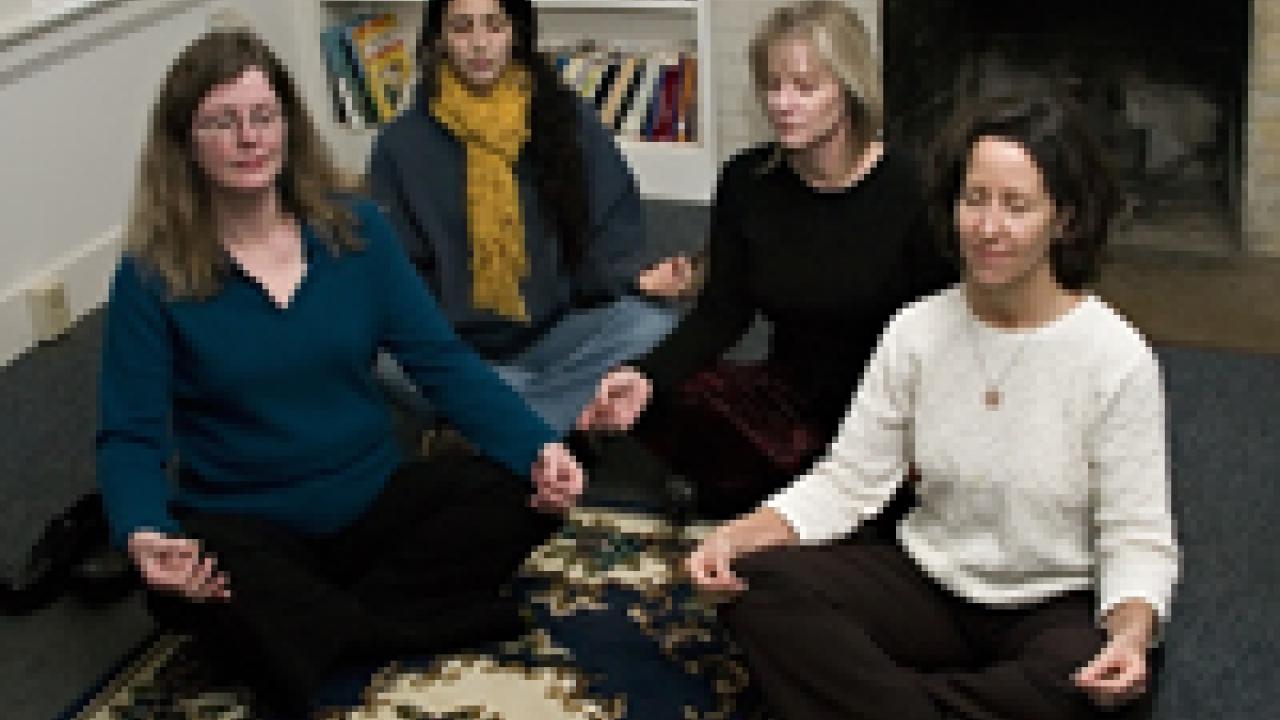Beth Cohen began meditating 12 years ago. The reason was simple — she wanted to lead a healthier life.
"I was always anxious," said Cohen, director of the Academic and Staff Assistance Program, or ASAP. Soon enough, she discovered that meditation dramatically increased her quality of life. After meditating for six years, she took some courses and became a certified meditation instructor herself.
Cohen, who moved to Davis two years ago, decided to put her expertise to use. She channeled her energies into facilitating the Introduction to Meditation course for faculty and staff during the 2007 fall quarter. What she did not expect was how popular the eight-week course would be.
"Seventy-five people signed up," she said. "We had to change rooms to find a way to accommodate all of them."
The next class begins March 3, and will be held from noon to 1 p.m. in the Emergency Operations Center. "We just move all the tables out," said Cohen, "and it works wonderfully as a setting."
Why the rising interest in meditation, an ancient practice that teaches stress reduction strategies? True, meditation has been around since ancient times in Eastern cultures, and the 1960s boom in Transcendental Meditation, or TM, is long gone by now.
But something feels different about it when not just rock stars and Indian mystics — but plain ol' folks — are sitting cross-legged and still on the floor. In any day or age, some are drawn to living harmonious lives and are willing to learn how to cope with workplace stress or just the pressures of everyday life.
"I think people are hungrier today than ever to learn skills to gain more energy and health in their busy lives," Cohen said.
The course, which is a lecture and discussion for the first 20 minutes before actual meditation, is a way to instruct people how to "cope, not react" to the stress in their lives.
She cautions that meditation is not only about relaxation. "The goal in meditation is for the body to learn calmness. And when the body is calm, it also goes into a healing state. Daily meditation practice changes the way the brain functions."
Through regular meditation, Cohen said, "the brain centers changes. Meditation quiets the fear, anxiety, and inattentive centers and awakens the calm, peaceful, focused centers of the brain."
The benefits of meditation are not only psychological, but physical as well. Daily practice has been found by physicians to lower blood pressure, heart rate and respiration.
"Yogis have known this for thousands of years but were never able to prove it," Cohen said. "Now with MRIs, they can. Jon Kabat-Zinn and other researchers have tested the Dalai Lama and other long time meditators. They had them meditate while scanning their brains and watched what parts of their brains lit up."
Changes, of course, are not immediately obvious to the recent convert. Cohen's rule about meditation is, "To know it works, don't look at how your meditation went that day — look at how you are changing as a person in everyday life."
The young and the calm
Staff and faculty are not the only ones enjoying access to meditation as a stress-reducer. Fourth-year undergraduate Tyler Fyotek hosts Midday Meditation, two half-hour meditation sessions Monday through Friday, to which students, faculty, and staff are welcome.
"Meditation gives me greater clarity when I go about my daily tasks," said Fyotek. "I just take greater pleasure in the things I do. It's disciplining."
Fyotek is not an instructor — he calls himself a facilitator — but provides cushions and, in conjunction with "The House," a place for students to come and meditate (TB 16 off California Avenue on Regan Circle Drive.)
Student interest in meditation, however, has not been as enthusiastic as those attending Cohen's courses, a fact that both Cohen and Fyotek regret.
"Students are still trying to get through the day, every day," said Fyotek, who explained that this made it difficult for students to commit to regular meditation. Student attendance, he said, fluctuates, and "a lot of students just aren't willing to commit to a routine."
Cohen observed, "If students — or anyone — meditated for 20 minutes a day, their lives would change. Stress at school or the workplace would diminish, and their ability to find joy and calmness in everyday life would increase."
The meditation class is offered from noon to 1 p.m. Mondays at the Emergency Operations Center. The eight-week course begins on March 3. To sign up, call (530) 752-2727.
Haley Davis is a former Dateline intern.
Media Resources
Clifton B. Parker, Dateline, (530) 752-1932, cparker@ucdavis.edu
